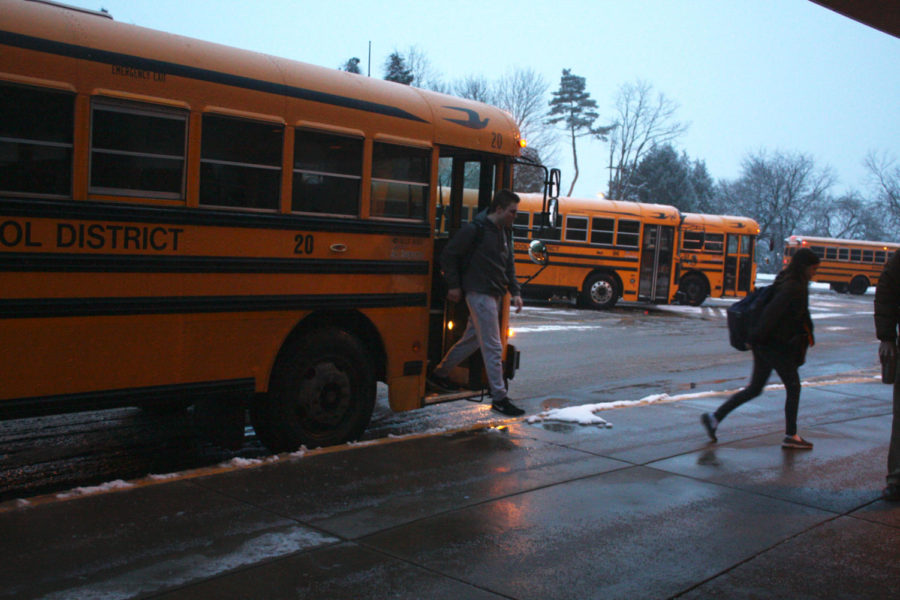Districts mull start times
January 29, 2018
Some high schools across the nation are pushing back start times for high schools, but Baldwin administrators say that any change here would require lots of planning and discussion.
It’s a well known fact that high schoolers don’t like waking up in the morning, but numerous recent scientific studies have suggested that it really is harder for teenagers to get up early. A recent New York Times article cited studies that show how teenagers have trouble falling asleep and waking up early, leading to a lack of sleep that negatively affects their health.
As a result, some schools throughout Allegheny County and across the country have been considering later start times. But many schools, including Baldwin, are hesitant to change the start time due to the wide-ranging effects it would have.
Superintendent Dr. Randal Lutz said he has seen the research, and sees evidence of it in his family.
“I see it myself with my girls. When I am ready for bed at 11 p.m., they often have at least an hour of work to complete before they are done for the day. Then the alarm is going off again at 6 a.m.,” Lutz said. “It is a pattern that leads to anxiety, stress and depression.”
Lutz said he sees changes at Baldwin as a possibility because he understands how the current high school schedule can be detrimental to teens.
“If there is something that might improve this, we should do everything we can to make the attempts to change.”
However, when schools consider all of the complications that come with changing their start times, the decisions become much more difficult, administrators said.
“The research has some merit, but there’s a lot more to changing the start time,” Principal Dr. Walter Graves said.
Lutz agreed and said that any such change would take time and planning.
“This would not be something that should be rushed,” Lutz said.
Many administrators, including West Allegheny High School Principal Kevin McKiernan, worry about the effects of a change. West Allegheny discussed the possibility of starting later, but they have no plans to do so.
“Issues such as district-wide busing, after-school athletics activities, and the career and technical center schedule alignment are just a few of the major hurdles that a district must consider when adopting a later start time,” McKiernan said.
Lutz said he thinks logistics would be a significant issue.
“Baldwin Whitehall is a system of five schools, however linked via a transportation system to about 50 schools. Our transportation department is responsible for getting the majority of those children to and from school everyday. A change in one area, regardless of how great it might be, will have significant impact in other areas,” he said.
Overall, while the research supports a later start time for high schoolers, complications may hinder major results.
“Personally and professionally, it makes a lot of sense. I see the stress that children are under. Much of it is related to lack of proper sleep,” Lutz said. “If just speaking for the high school, I would love to see a later start time. But when looking at the total district, we will have to see what works best for all students since all parts are so interconnected.”
Many administrators also have concerns about pushing back times of athletic events and practices, but Baldwin Athletic Director Vince Sortino thinks it wouldn’t be an issue.
“Most sporting events are in the evenings, and even practices don’t start until 3 or 3:30 p.m.,” Sortino said.
Officials at Quaker Valley agreed, and decided that the advantages of a slightly later start time for its high school outweigh the disadvantages.
This school year, Quaker Valley pushed its start time back 15 minutes, from 7:45 to 8 a.m.
“The students love it. They really appreciate the extra 15 minutes and they seem to be more awake and ready to start the day. I haven’t heard any negative feedback,” Abby Bator, assistant principal of Quaker Valley, said.
Bator also stressed the amount of planning that was needed before the change was made.
“There was a lot of discussion and decision-making at the district administrative level. I am not sure exactly how long it took to finalize all of the details. I believe it all took place throughout the course of last school year,” she said.
Graves said he understands the amount of planning that would go into a change.
“If we did decide to make a change, we would make sure everyone is represented on committees and we would work out the details together,” he said.
Graves previously worked at a school in York County that moved back the high school start time from 7 to 8 a.m. Despite initial concerns, the change worked out well and there were few complaints, he said.
“Parents raised concerns at school board meetings, but the change wasn’t as bad as some people thought,” he said.
Several schools are discussing the possibility of change, including Hampton, North Allegheny, Moon Township, and Pine-Richland. Other schools, meanwhile, already have later start times than average and aren’t planning on changing any time soon, such as Mt Lebanon and Brentwood, which both already start at 8 a.m.
Upper Saint Clair High School currently starts at 7:30 a.m. and they’re working to determine the best strategies to implement a later start time, Principal Dr. Louis Angelo said.
“I think it is malpractice to ignore the research on adolescent brains. As an educator, if I know my actions could improve the educational experience for students, then why wouldn’t I do it?” Angelo said.






